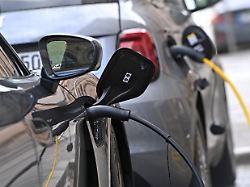“Threaten to lose touch”
The car industry fears for international importance
01/11/2023 4:27 p.m
The lack of chips and the energy crisis are increasingly burdening the German automotive industry. The politicians are too unambitious, especially with regard to China and the USA, Germany is lagging behind, warns VDA boss Müller. In order to be able to maintain the global connection, the association is pushing for concrete reforms.
The German automotive industry is sounding the alarm in view of the increased energy costs and the worldwide increasing locational competition. “Without an ambitious program for competitiveness and location, we risk losing the connection globally,” said VDA boss Hildegard Müller at an online press conference. Germany is in danger of losing ground due to the US subsidy program worth billions and the confrontation with China. “The industrial location is falling behind internationally.” If no countermeasures are taken here, the climate protection efforts in Europe will have the exact opposite effect, namely the relocation of companies abroad with little or no environmental regulations there. At the same time, competition from Chinese automakers is increasing in Europe.
“The USA is pursuing a consistent policy that creates the conditions for paving the way for climate neutrality in the transport sector,” said the head of the association. Europe must react to this. The global axes must be prevented from shifting. “Only if we remain internationally relevant will we continue to have global political weight in the future,” emphasized Müller.
She again criticized the protectionism inherent in the US government’s Inflation Reduction Act. “The EU Commission must continue to work towards improvements and a sustainable solution for vehicles from EU manufacturers.” It is also important to prevent US funding practices from being followed by imitators and counter-reactions that could lead to a spiral of protectionism.
“Europe needs agency for strategic raw materials”
The European response to tendencies towards de-globalization should be raw material and trade agreements as well as energy partnerships in order to reduce dependencies. In order to prevent bottlenecks in the supply of the raw materials required for the expansion of e-mobility, the pace must be increased. “Europe now needs an agency for strategic raw materials,” said Müller.
The federal government called on Müller to ensure an affordable and sufficient CO2-neutral energy supply. So far, politicians have essentially dealt with overcoming the acute energy crisis without ensuring a long-term, strategic supply. Germany urgently needs an expansion of the energy supply, demanded Müller. The VDA boss did not specify from which sources the additional energy should come so that prices can fall. That’s up to the suppliers, said the former energy industry lobbyist.
After the corona pandemic, the energy crisis as a result of the war in Ukraine relentlessly exposed the weaknesses of the location. The high costs are already having serious consequences for medium-sized companies, said Müller. More and more often she hears the question of whether Germany is still the right location. According to a survey of suppliers, 22 percent want to shift investments abroad. 53 percent want to postpone planned expenses or even cancel them.
Cautious optimism for 2023
After a mixed year, the industry is looking to 2023 with cautious optimism. After the supply bottlenecks and production stops in the past Corona year, car manufacturers and suppliers are counting on the supply running smoothly again. At the same time, the special boom, in which the manufacturers were able to push through high prices and bring in substantial profits due to strong demand, is coming to an end. Despite inflation and economic uncertainty, car sales in Germany are likely to grow by two percent to a good 2.7 million units. That would still be a quarter less than in the pre-crisis year of 2019.
For Europe (EU27, EFTA, UK), the VDA expects sales to increase by five percent to 11.8 million vehicles. In the USA, the market for so-called light vehicles should increase by four percent to 14.2 million units. The VDA is forecasting growth of three percent to 23.7 million units for China, the world’s largest passenger car market. This results in moderate growth of four percent for the global market to 74 million vehicles, 6.5 million fewer than in 2019.
